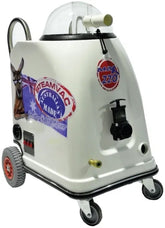Below FAQ are some common concerns of our clients before purchasing the theme.
If you have other questions, please just send it to sales@cleaningproductssupplies.com.au.
Need Help?
If you have an issue or question that requires immediate assistance, you can click the button below to chat live with a Customer Service representative.
If we aren’t available, drop us an email and we will get back to you within 20-36 hours!
Soap dispensers facilitate convenient access to liquid soap, significantly enhancing hand hygiene practices. By minimising direct contact, they reduce cross-contamination risk, promoting a healthier environment.
Cleaning detergents include multipurpose cleaners for general surfaces, bathroom cleaners formulated to tackle soap scum and mildew, glass cleaners for streak-free shine, and disinfectants that kill a broad spectrum of pathogens, each tailored to specific cleaning needs.
While most liquid soaps are suitable, avoid overly thick or gel-like soaps, as they may clog dispensers. It’s best to check manufacturer guidelines for compatibility.
Microfiber cloths are designed with fibres that trap dirt, dust, and bacteria. They require less water and cleaning solution, are highly durable, and can be washed and reused, making them an environmentally friendly choice.
When choosing a disinfectant, look for EPA-approved products that specify efficacy against various pathogens, including viruses and bacteria, compatibility with the cleaned surfaces, and safety for occupants.
Essential products include car wash soap, wax, multipurpose cleaners, clay bars, tar removers, bug removers, wheel cleaners, microfiber cloths, and detailing brushes.
Depending on environmental conditions and how often you drive, it is recommended that you wash your car every 1 to 2 weeks. Regular washes prevent dirt buildup and protect the paint.
The best wax depends on your needs. Natural wax (carnauba) shines intensely, while synthetic wax provides long-lasting protection. Liquid wax is easy to apply, while paste wax may offer better durability.
Identify the specific issue you need to address (e.g., removing tar, bugs, or dirt) and select a cleaner formulated for that purpose. Always read labels and follow instructions.
No, household cleaners can be too harsh and may damage your car's paint or interior surfaces. Always use products specifically designed for automotive use.
Cleaning chemicals are formulated to remove dirt, stains, and contaminants from various surfaces. They are more efficient and effective than water or brushes.
Many cleaning chemicals contain surfactants and enzymes that help break down grease, dirt, and organic matter, allowing for easier removal and leaving surfaces clean and hygienic.
While many cleaning chemicals are user-friendly, reading labels and choosing safe products for children and pets is crucial. Always follow manufacturer instructions for safe application.
Synthetic cleaning chemicals are man-made and often more potent, while natural cleaning products use plant-based or biodegradable ingredients. Both can be effective, but natural options may be preferable for eco-conscious consumers.
Cleaning chemicals should be stored in their original containers, away from direct sunlight and out of reach of children. Always follow safety instructions and use appropriate protective gear when handling.
Cleaning gloves create a protective barrier between your skin and potentially harmful substances, including germs, chemicals, and allergens, thus mitigating the risk of cross-contamination and enhancing overall hygiene during cleaning tasks.
Polyethylene and vinyl gloves are often used for food preparation due to their disposable nature and cost-effectiveness. Latex gloves provide excellent tactile sensitivity for intricate tasks, while nitrile or oil-resistant gloves offer robust protection against chemicals and sharp objects, making them suitable for heavy-duty applications.
Biodegradable and compostable bin liners break down more rapidly in landfills and composting environments, thus reducing plastic pollution and supporting sustainable waste management practices by minimising the environmental impact of disposal.
Consider capacity (size), strength (gauge), and intended use when selecting trash bags. For instance, heavy-duty bags are necessary for yard waste or sharp items, while lighter bags suffice for general household waste.
Latex gloves are ideal for situations requiring precision and flexibility, such as cleaning delicate surfaces or handling food. However, individuals with latex allergies should opt for synthetic alternatives like nitrile.
Janitorial cleaning supplies are tools and products used in professional cleaning services to maintain cleanliness and hygiene in facilities such as offices, schools, and hospitals, ensuring safe and sanitary environments.
Regular janitorial cleaning reduces pathogenic load by systematically sanitising surfaces, lowering the incidence of workplace illnesses. This proactive approach promotes employee well-being and fosters a positive workplace culture.
Janitorial cleaning must adhere to various health and safety regulations, such as OSHA guidelines and local health department standards. Regular training, proper documentation, and the use of compliant cleaning agents help facilities maintain these standards.
When choosing janitorial cleaning products, it is crucial to consider their biodegradability, toxicity levels, and certifications (such as Green Seal or EcoLogo). Products that minimize environmental impact while providing effective cleaning solutions are increasingly prioritized.
High-quality janitorial supplies reduce wear and tear on surfaces and equipment, minimise the need for frequent replacements, and lower repair costs over time. Investing in durable products ultimately leads to cost savings and enhanced facility longevity.
Common cleaning machinery includes pressure washers, industrial vacuums, scrubber-dryers, steam cleaners, and floor sweepers. Each is designed to address specific cleaning needs in large environments like corporate offices, hospitals, and malls, enhancing efficiency and effectiveness.
Pressure washers use high-speed water jets to dislodge dirt and debris from various surfaces, including carpets, concrete floors, and outdoor areas. Their adjustable pressure settings make them versatile for different cleaning tasks, from delicate surfaces to heavy-duty applications.
Industrial vacuums are engineered for heavy-duty cleaning and can handle spills, fine dust, liquids, and bulk materials. They provide greater suction power, larger capacity, and specialised attachments, making them suitable for commercial and industrial environments.
Steam cleaners sanitise surfaces at high temperatures without chemicals, making them ideal for restricted chemical use or sensitive materials requiring gentle cleaning. They also effectively kill bacteria and remove dirt.
Recommended PPE includes gloves, safety goggles, non-slip footwear, and ear protection, particularly for industrial vacuums and pressure washers, which can produce noise and hazards. Proper PPE is crucial for minimising risks during cleaning operations.
Food packaging supplies serve essential functions such as facilitating easy handling, storage, and transportation of food products. They help preserve food quality, ensure safety, and promote efficient producers' and consumers' distribution.
Wraps such as plastic wrap and aluminium foil create a barrier against moisture, air, and contaminants, keeping food fresh and warm. They are handy for short-term storage and often cover leftovers or prepared meals.
Many modern food packaging supplies are made from biodegradable or recyclable materials, reducing waste and environmental impact. Utilising sustainable options promotes eco-friendly practices and enhances a brand’s reputation among environmentally conscious consumers.
Food packaging must adhere to safety regulations set by authorities like the FDA or local health departments. These regulations ensure that materials are safe for food contact and that labelling provides accurate and necessary information. Compliance is essential for consumer safety and legal accountability.
Effective packaging preserves food quality, ensures convenience, and provides clear information, all contributing to a positive customer experience. Well-designed packaging can also attract attention and encourage repeat business.
The toilet paper provides a sanitary method for cleaning after using the toilet, helping to prevent infections and maintain cleanliness. Hand towels assist in drying hands, reducing moisture that can promote bacterial growth, thereby enhancing hygiene.
Hand towels absorb water more effectively than air dryers, reducing drying time and minimising the transfer of bacteria. Disposable paper towels can also prevent the spread of germs in shared environments, as users can avoid touching common surfaces.
Disposable paper towels are designed for single-use convenience and immediate disposal, reducing the risk of cross-contamination. Reusable cloth towels are eco-friendly and cost-effective over time but require regular washing and maintenance to ensure hygiene.
Consumers should evaluate factors such as absorbency, strength, softness, environmental impact (e.g., recycled content), and suitability for their plumbing systems. Additionally, personal preferences regarding fragrance and texture may influence their choices.
Best practices include storing hand towels in a clean, dry environment, using disposable options in shared spaces to reduce contamination, and ensuring toilet paper is kept in sanitary conditions. Regularly replacing and washing towels is essential for optimal hygiene.




